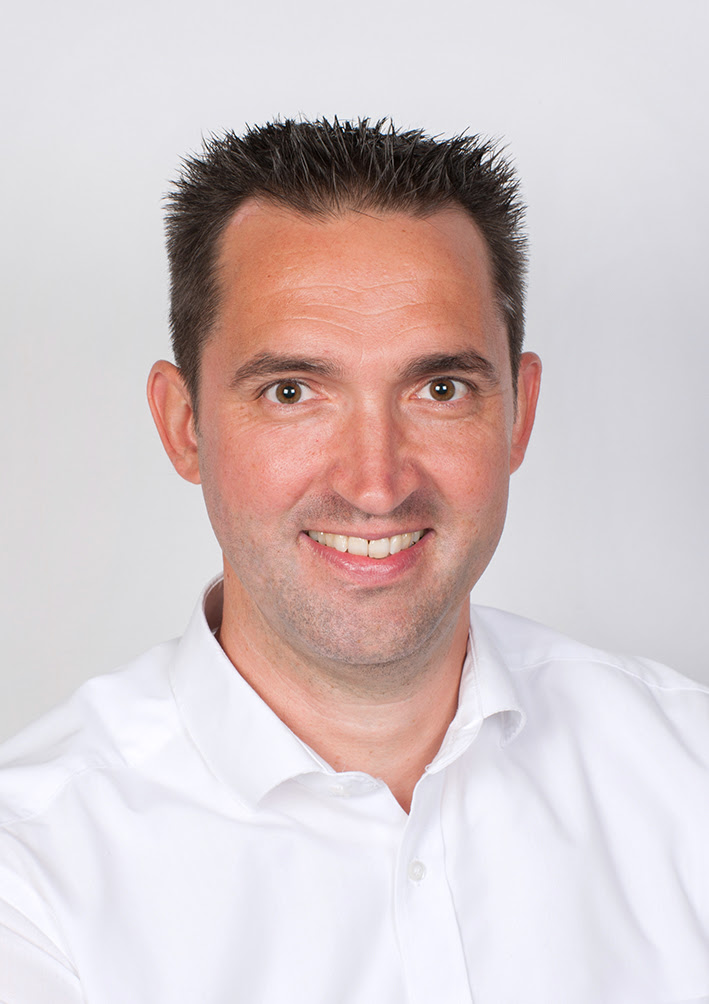|
|
Fall 2019: Upcoming Seminars
|
|
Circuits and Systems for In-Band Full-Duplex Applications
Speaker:
Kenneth Kolodziej
Date:
Friday, Dec. 6th, 2pm, CEPSR 414
|
|
|
|

Prof. Maurits Ortmanns
University of Ulm
Date:
Wednesday, Oct. 9th, 2:00pm-3:00pm,
Location:
MUDD 1300
|
[SSCS Distinguished Lecture]Implantable electronics for highly parallel neural interfaces
Abstract:
Implantable medical devices (IMD) are nowadays widely employed to restore functions to the impaired individuals suffering from diseases like deafness, blindness, cardiac insufficiency, incontinence, neural disorders, and many more. Such implantable systems become increasingly challenging, if a large number of sensing or stimulating sites needs to be realized - space and power budget, safety issues, high bidirectional data rates, as well as the vast number of electrical interfaces make the electronic circuit design a complex task of research and development.
This talk will highlight some of the recent worldwide advances towards the realization of high channel count implantable neural interfaces, covering applications and system examples such as the retinal implant and neural modulators with high efficiency frontends, as well as give an overview of the supporting circuitry, such as transcutaneous data telemetry including safety and security aspects, power telemetry, and adaptive power management.
Biography:
Maurits Ortmanns received the Dr.-Ing. degree in microsystems engineering from the University of Freiburg, Germany, in 2004, with highest honors. From 2004 - 2005, he has been with sci-worx GmbH, Hannover, Germany, where he was working in the field of mixed-signal circuits for biomedical implants. In 2006, he was appointed Assistant Professor for Integrated Interface Circuits at the Institute for Microsystems Engineering at the University of Freiburg. Since May 2008, Prof. Ortmanns is full professor at the Faculty of Electrical Engineering and Computer Science at the University of Ulm, where he heads the Institute of Microelectronics.Prof. Ortmanns' main research interests include mixed-signal integrated circuit design, self-correcting and reconfigurable analog circuits, with special emphasis on data converters and implantable electronics.Prof. Ortmanns received the VDI and the VDE award in 1999, Best Student Paper Awards at MWSCAS 2009 and at SampTA 2011, the ITG Publication Award 2015, best demo awards at ICECS 2016 and SENSORS 2017, and the faculty teaching awards 2012 and 2015.He served as program committee member of ESSCirC, DATE, ICECS, and ECCTD, as Associate Editor of the IEEE Transactions of Circuits and Systems I and II and as Guest Editor of the IEEE Journal Solid State Circuits. Prof. Ortmanns was a Technical Program and Executive Committee member of the IEEE International Solid-State Circuits Conference (ISSCC) between 2012-2016 and the European Regional Chair of ISSCC 2015. He holds several patents, is author of the book "Continuous-Time Sigma-Delta A/D Conversion" and several other book chapters, and he contributed more than 250 IEEE journal and conference papers.
|
|

Prof. Sungjoo Woo
Seoul National University
Date:
Friday, Oct. 18th, 11:00am-12:00pm
Location:
CEPSR 414
|
Low-Precision Neural Network Design towards 4-bit MOBILENET
Abstract:
Bit-width needs to be minimized for efficient neural network design in terms of chip area, code size, and, most importantly, energy efficiency. In this talk, we first review state-of-theart quantization methods in the industry and academia and introduce our ideas of outlier quantization and precision highway. We also briefly report the current work on a 4-bit linear weight/activation quantization of MobileNet v3.
Biography:
Sungjoo Yoo (M’00) received Ph.D. degree from Seoul National University, Seoul, South Korea, in 2000. From 2000 to 2004, he was a Researcher with SLS Group, TIMA Laboratory, Grenoble, France.,From 2004 to 2008, he was a Senior/Principal Engineer with System LSI, Samsung Electronics, Suwon, South Korea. From 2008 to 2015, he was an Assistant/Associate Professor with POSTECH, Pohang, South Korea. In 2015, he joined Seoul National University, Seoul, South Korea. His current research interests include memory/storage subsystem and software/hardware optimizations for deep neural networks including network compression, quantization, and hardware accelerators.
|
|

Dr. Jason Soric
Raytheon
Date:
Friday, Nov. 8th 2:00pm-3:00pm
Location:
CEPSR 414
|
Wave Control via Metasurfaces, Modulation, Non-Linearities, and Mode Selection
Abstract:
In this talk, we look at ways metamaterial technologies have solved modern-day challenges. Engineered metasurfaces have shown to strongly suppress scattering at all angles, while still allowing for field penetration inside the “cloaked” region. This important property opens great opportunities across a multitude of sensor applications. We will explore practical applications of cloaking techniques including: low observability, co-site interference mitigation, and low observable sensors with optimal received power.
Applications of ferrite-less non-reciprocity will also be discussed using spatio-temporal modulation and non-linearities. Here, we look at experimental demonstrations of non-reciprocal antennas using dispersion engineering and isolators using non-linearities.
Biography:
Jason C. Soric, PhD is a Senior Electrical Engineer in product development at Raytheon Integrated Defense Systems (IDS). Dr. Soric joined Raytheon IDS in 2016 where his activities include high power solid-state power amplifiers, microwave acoustics, and microwave magnetics. Dr. Soric has over 8 years of professional experience across a wide range of topics from electro/magneto-dynamics to antenna and circuit design. His notable contributions include the first of its kind realization of the ultra-thin “mantle” metasurface for co-site interference mitigation and demonstrations of spatio-temporally modulated devices, including, magnetic-free circulators and non-reciprocal antennas. Dr. Soric received 1st place presentation at the 2012 WMCS hosted at Baylor University in Waco, TX. He also received 3rd place in the student paper competition (SPC) at the 2012 IEEE APS in Chicago, IL, and was selected as a 2014 finalist and 2015 honorable mention for the SPC of the same conference in Memphis, TN and Vancouver, BC, respectively. He received the company-wide Raytheon IDEA award in 2017, and served as an industry liaison for SRC JUMP and AFOSR since 2018. Dr. Soric was the IEEE Microwave Magazine Guest Editor in 2019, and he has authored or co-authored 12 journal papers and 19 conference papers and currently holds six patents.
|
|

Dr. Xin Zhang
IBM
Date:
Friday, Nov. 22nd, 2:00pm-3:00pm
Location:
CEPSR 414
|
Power converters for servers and data centers
Abstract:
Due to the explosive growth of cloud and AI computing, servers and data centers are increasingly consuming more electrical power, when high performance CPUs and GPUs are demanding ever-increasing power density. How to deliver power from the wall plug to silicon cores has become a critical question for the emerging computing systems. In this talk, we will start with overview of power delivery architectures in servers, and then move on to advanced power delivery techniques. The talk will also discuss the advantages and practical considerations of the different approaches, and some state-of-the-art converter examples.
Biography:
Xin Zhang is a research staff member at IBM T. J. Watson Research Center, Yorktown Heights, NY, where he has been working on power converters and packaging solutions for servers and HPC systems since 2014. Before joining IBM, he was with the Institute of Microelectronics, Agency for Science, Technology and Research (A*STAR), Singapore, as a scientist. And before that, he was with Institute of Industrial Science, University of Tokyo, Tokyo, Japan, as a researcher. In 2012, he was a visiting scholar at the University of California Berkeley. He received the B.S. degree in electronics engineering from Xi’an Jiaotong University, Xi’an, China, in 2003, and the Ph.D. degree in microelectronics from Peking University, Beijing, China, in 2008. Dr. Zhang has authored or co-authored over 40 technical papers and a number of patents. His research interests include analog circuits, power devices and converters, magnetics and emerging computer system architecture. He has served as guest editors for IEEE Journal on Emerging and Selected Topics in Circuits and Systems (JETCAS) and IEEE Solid State Circuits Letters (SSC-L). He is a Senior Member of IEEE. He is a TPC member for IEEE VLSI Symposium on Circuits and Applied Power Electronics Conference (APEC).
|
|

Kenneth Kolodziej
MIT Lincoln Laboratory
Date:
Friday, Dec. 6th, 2:00pm-3:00pm
Location:
CEPSR 414
|
Circuits and Systems for In-Band Full-Duplex Applications
Abstract:
Many wireless systems could benefit from the ability to transmit and receive on the same frequency at the same time, which is known as In-Band Full-Duplex (IBFD) and/or Simultaneous Transmit and Receive (STAR). This technology could lead to enhanced spectral efficiency for future wireless networks, such as fifth-generation New Radio (5G NR) and beyond, and/or could enable capabilities and applications that were previously considered impossible, such as IBFD with phased array systems. This talk will highlight some of the key technologies required to suppress the inherent self-interference that is generated in IBFD systems, and will present several applications that have incorporate these concepts.
Biography:
Mr. Kenneth E. Kolodziej is a technical staff member in the RF Technology Group, where he is a principal investigator on wideband electronic and simultaneous transmit and receive (STAR) systems. Since joining Lincoln Laboratory, Mr. Kolodziej has conducted research on RF, microwave and photonic circuits, including antenna, radar and communication systems. Mr. Kolodziej also teaches an electromagnetics course to undergraduate students at the Massachusetts Institute of Technology (MIT), and several "Build-a-Radar" courses on MIT campus. Mr. Kolodziej received his BE and ME degrees in electrical engineering from Stevens Institute of Technology in Hoboken, New Jersey.
|
|
Fall 2019 Seminars
|
|
Title:
[SSCS Distinguished Lecture]Implantable electronics for highly parallel neural interfaces
Speaker:
Prof. Maurits Ortmanns
Date:
Wednesday, Oct 9th, 2pm, MUDD 1300
Title:
Low-Precision Neural Network Design towards 4-bit MOBILENET
Speaker:
Prof. Sungjoo Woo
Date:
Friday, Oct. 18th, 11am, CEPSR 414
Title:
Wave Control via Metasurfaces, Modulation, Non-Linearities, and Mode Selection
Speaker:
Dr. Jason Soric
Date:
Friday, Nov. 8th , 2pm, CESPR 414
Title:
Power converters for servers and data centers
Speaker:
Dr. Xin Zhang
Date:
Friday, Nov. 22nd, 2pm, CEPSR 414
Title:
Circuits and Systems for In-Band Full-Duplex Applications
Speaker:
Kenneth Kolodziej
Date:
Friday, Dec. 6th, 2pm, CEPSR 414
|
|
|
|
|

